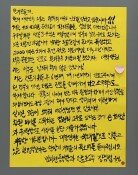[Opinion] Public Broadcastings Grip
Broadcasting System (KBS) has made a new cable channel. KBS Sky Family, which will soon be on the air, is an entertainment channel that will specialize in quiz shows and variety shows. Most of the day time broadcasts allowed on KBS last December were reruns. KBSs lax administration is expanding its business when it should be restructuring. The criticism of the masses couldnt be lost on KBS. The reason it still keeps going in the wrong direction is because of egotism within the organization.
During the last World Cup season, KBS sent out 11 hours and 32 minutes of World Cup related programs a day on its two channels put together. Even though it is a sum of both channels, this is longer than SBS, which sent out nine hours 58 minutes of World Cup related programs a day. The hope that a public broadcasting system would still keep its dignity at a peak season like the World Cup ended up simply being a wish. The most serious problem is that KBS and other major terrestrial broadcasters are becoming market monopoly enterprisers and controlling the broadcasting world.
Terrestrial broadcasters are spreading their hold over their rival, cable. The rate of advertisement sales is eight to two, with terrestrial broadcasters in a superior position. Through subsidiary companies such as KBS Sky, terrestrial broadcasters have branched out into cable and are taking home over 80% of the pure earnings of the whole cable business. This is due to the low costs, high earnings system of showing reruns of popular shows on cable. With this monopoly, KBS collects subscription fees whether or not their programs are being watched. In the first half of this year alone, KBS raised a profit of 66.1 billion won.
However, this year KBS applied for and was allocated 4.3 billion won from the national treasury. For next year, they have already applied for 17.9 billion. Even if it is for broadcasting to be sent abroad, this is too much. They send out advertisements and receive subscription fees, and if a loss is predicted, they immediately apply for help from the public. This is their truly easy operation method. Even President Roh Moo-hyun, who said he was thankful to the media, has lamented, There is no way to manage them. What can the people do?
Hong Chan-sik, Editorial Writer, chansik@donga.com
Headline News
- Med professors announce intention to leave hospitals starting Thursday
- Bridge honoring Sgt. Moon Jae-sik unveiled in Pennsylvania
- Chief of Staff Chung tells presidential secretaries to stay away from politics
- US FTC bans noncompete agreements
- N. Korea launches cyberattacks on S. Korea's defense companies







